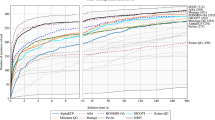Abstract.
We use semidefinite programming to prove that any constraint satisfaction problem in two variables over any domain allows an efficient approximation algorithm that does better than picking a random assignment. Specifically we consider the case when each variable can take values in [d] and that each constraint rejects t out of the d 2 possible input pairs. Then, for some universal constant c, we can, in probabilistic polynomial time, find an assignment whose objective value is, in expectation, within a factor \(1- \frac{t} {d^{2}} +\frac{ct} {d^{4}log d}\) of optimal, improving on the trivial bound of \(1- \frac{t} {d^{2}}\).
Similar content being viewed by others
Author information
Authors and Affiliations
Corresponding author
Additional information
Selected by the editors.
Manuscript received 27 September 2007
Rights and permissions
About this article
Cite this article
Håstad, J. Every 2-csp Allows Nontrivial Approximation. comput. complex. 17, 549–566 (2008). https://doi.org/10.1007/s00037-008-0256-y
Published:
Issue Date:
DOI: https://doi.org/10.1007/s00037-008-0256-y




